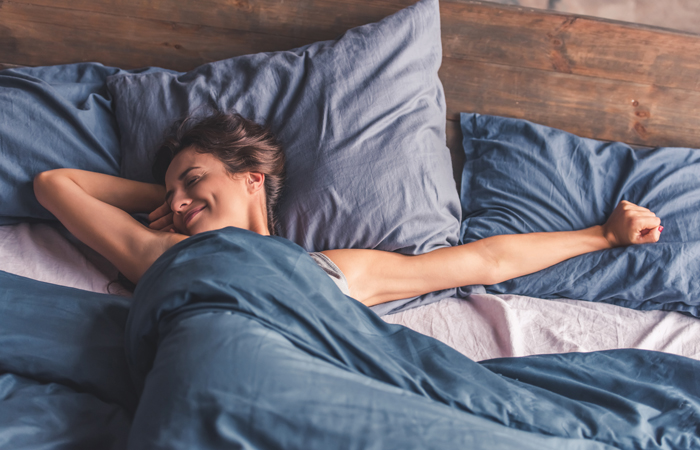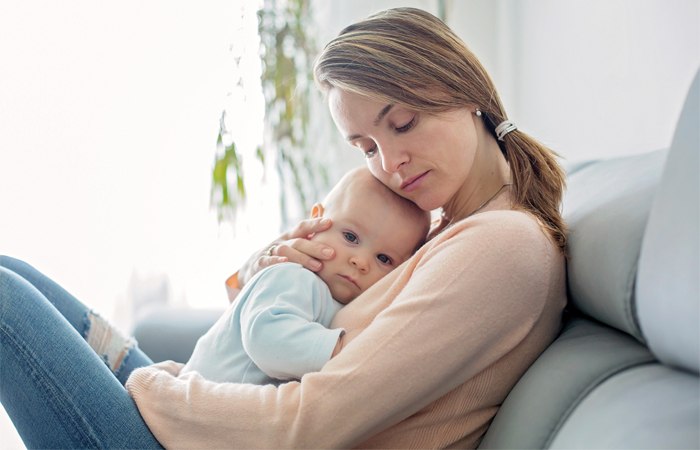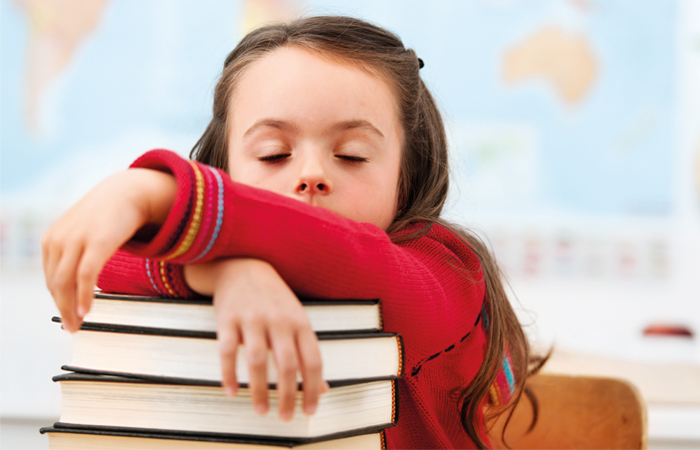Put insomnia to bed
In OTC
Follow this topic
Bookmark
Record learning outcomes
Sleep is extremely important to physical and mental health and shouldn’t be taken lightly, but many people are guilty of not getting enough sleep, whether intentionally or not. So what can they do to adopt healthier sleep habits?
Tiredness is a fact of life, with everyone having the odd phase where they’re lacking in energy and feeling like they can’t focus on their day. In fact, research from Nytol suggests that 50 per cent of adults aren’t getting enough sleep, one in four say they would feel happier if they had more sleep and one in five people admit they actually feel tired every day due to a lack of sleep.

While it only takes one bad night’s sleep to affect our mood, concentration and alertness, long-term sleep deprivation has far more serious consequences – it’s been linked to a number of serious health problems including obesity, high blood pressure, heart disease, diabetes and stroke. But all of these risks can be reduced if the cause of someone’s insomnia is identified and steps are taken to resolve the issues quickly.
What is good sleep?
Everyone is different, and that means the amount of sleep that people need differs too. The general consensus is that most adults require somewhere between six and nine hours, and around seven to eight hours is optimal.
“It’s about the quality of the sleep you get, not the quantity. Too many people focus on sleep quantity but what’s important is that the sleep you do get is of good quality,” says Lisa Artis, sleep advisor at The Sleep Council. “Broken or interrupted sleep can leave you feeling as sleep deprived as if you’d just had four hours rest a night because you are disrupting the natural sleep rhythm. It may mean you do not reach the most restorative, deeper phases of sleep.”
As a general rule, “a good night’s sleep should leave you feeling refreshed and ready to tackle the day,” says Lisa. “Being tired doesn’t mean you’ve not had enough sleep; however, if you feel sleepy, exhausted and unable to function then chances are you are not sleeping well.”
The Healthy Sleep Project – an on-going research project into the sleep of “healthy” individuals by Northumbria University and commissioned by The Sleep Council – has found that the biggest indicator of good sleep health is not how much sleep an individual gets, but how long they perceive it takes them to fall asleep. The research shows that those who think they fall asleep within 10-15 minutes of their head touching the pillow are more likely to have good sleep health, while longer than 15 minutes means that sleep health may be under pressure.
“What we found was a huge variety in terms of how well people who define themselves as good sleepers actually sleep. Some of the study group were doing exceptionally well – looking after their sleep with good routines. Others were sacrificing sleep, possibly due to the demands of their lives,” says the study’s lead, Professor Jason Ellis. “What is interesting is that the more you focus on getting off to sleep at night, the more likely it is to evade you. Trying to sleep is likely to make you physically and emotionally tense, so if you are overly monitoring how long it is taking you to fall asleep, it’s potentially an indicator that your sleep health may need attention.”
Physical and mental health
Sleep regulates mood and improves memory, concentration and performance and just one night of interrupted sleep can negatively affect these functions. In fact, sleep expert Neil Stanley says that a sleepless night has the same effect on cognitive function as drinking alcohol, and therefore affects work, driving, and day-to-day activities.
In addition, Lisa says: “There’s a close relationship between sleep and mental health; lack of sleep can be detrimental to our mental health, but conversely, mental health problems can also affect how well you sleep – both in terms of quantity and quality. So, it’s extremely important to address both issues.”
According to the Great British Sleep Survey, poor sleepers are seven times more likely to feel helpless, five times more likely to feel alone and twice as likely to have relationship problems, poor diet, low mood and energy levels, which can all have a negative impact on mental health and cause significant worry.
But it’s not just cognition that’s affected by poor sleep. “Regularly getting less than six hours a night is a no-go and there is research out there that has found that those who frequently get fewer than six hours a night are at significantly increased risk of stroke and heart disease, with evidence that not sleeping enough may ramp up the ‘fight or flight’ response to stress, releasing hormones that speed up heart rate and raise blood pressure,” says Lisa. In addition, Neil highlights the link between poor sleep and obesity, explaining that after a poor night’s sleep, people “generally crave sugary, fatty foods and consume 400 extra calories the next day”.
When experiencing sleep problems, Lisa says that tackling it early is key. “It’s difficult to put a time limit on these things, as it will differ according to an individual; however, if you’re experiencing sleep difficulties it’s important to nip them in the bud. If you leave it too long (over three months) issues become harder to resolve.”
Conversations about sleep often focus on sleep disorders such as insomnia, but Professor Ellis says that there is “an inordinate number of people who don’t have a sleep disorder but could be sleeping better, and it really does have huge health benefits.” So who’s likely to experience sleep difficulties and what can be done to improve their situations?
The new parent

It’s normal for new babies to only sleep for two to three hours at a time. It’s therefore a case of trial and error in getting them into a sleep routine and until that happens, a good night’s sleep may well be nothing more than a fond and distant memory for new parents.
The age-old advice of ‘sleep when the baby sleeps’ does carry some weight, but may not always be practical and so there are other tips that can be passed on.
Trying to keep the baby alert and active in the daytime and creating a calmer atmosphere in the evening can be useful in establishing the difference between day and night time. Lisa Artis also suggests 20-minute power naps for parents, which “can give you as much energy as two cups of coffee” and to “get some fresh air by going for a walk as it makes you more alert plus light, especially natural light, helps you feel awake by suppressing melatonin levels.”
For women, tiredness can begin even before the baby is born. “During pregnancy, it’s not uncommon to contend with many sleep disturbances, usually the result of anxiety and stress, hormonal fluctuations, and discomfort,” says Lisa. “Try to limit fluids in the evening to minimise loo trips in the night, talk through worries about impending labour and birth to help reassure you, take a nap if it’s convenient or take a half hour to rest up.”
Sleeping on the left side is also advisable as this allows the best flow of blood to the abdomen, womb (uterus) and kidneys, and can be more comfortable. Women can also be advised to put a pillow underneath the bump and in between the legs to help support their body while they sleep.
The shift worker
More than 3.5 million people are employed as shift workers in the UK, working in a wide variety of industries.
Changing shifts work against the body’s natural rhythm, as it requires people to try to stay awake at night when the body naturally wants to sleep, and then feel sleepy in the day when the body expects to be alert. In fact, research has shown that shift workers are six times more likely to be in a fatigue-related road accident than other workers.
But what people do before, during and after their shift can make a huge difference to their sleep and general wellbeing.
It can help to avoid a heavy meal before starting a shift as this can make people feel sleepy. Lighter meals and snacks are less likely to affect alertness or cause drowsiness. “Snack on energy giving foods (nuts, bananas, wholemeal toast) and avoid relying on caffeine. Use light to keep melatonin levels suppressed during night shifts. Equally use light, such as a sunshine alarm clock or light box, to regulate the body clock,” Lisa Artis advises. “When working a night shift, try a short nap (no longer than 40 minutes) around two hours before work to boost energy levels. You can catch up on ‘recovery sleep’ on weekends or days (though this doesn’t reverse all the effects of lost sleep) and where possible, try ‘anchor sleep’ where you have at least four hours sleep at the same time every night/morning (e.g. 3am-7am).”
Shift workers could also let friends, family and neighbours know their work schedule, so they can be considerate around the times they’re sleeping and avoid sleep being disturbed.
The blue light addict
“The problem is we don’t prioritise sleep and don’t adhere to a regular routine,” says Dr Neil Stanley PhD. “Some of the things that are aiding that are smartphones, Facebook, Netflix, Amazon and email presenteeism [people wanting to show they are working late outside of working hours].”
Blue light from these electronic devices stimulates the brain and disrupts the body’s circadian rhythms by suppressing the sleep-inducing hormone melatonin, making it more difficult for people to switch off.
Research has found that exposure to blue light from computer screens between the hours of 9 and 11pm shortens total sleep time, significantly suppresses melatonin production and diminishes sleep quality by increasing the frequency of night-time awakenings.
As such, people should be advised to remove computers, tablets, mobile phones and TVs from their bedrooms and avoid screen time before bed – particularly in the hour before settling down to sleep.
The traveller

The body clock is controlled by light levels and the body gets used to a regular pattern of daylight and darkness so when this is disrupted, for example by flying to a different time zone, tiredness can kick in as the body clock will become out of sync with the local time.
The world is divided into 24 time zones, each an hour different from the next, and symptoms of jet lag are typically felt when three or more of these zones are crossed. People are unlikely to be too badly affected flying from the UK to Europe, Africa or the Middle East, but chances are they will be affected when travelling from the UK to Asia, Australasia, America or Canada. Jet lag also tends to be a bigger problem when flying east as the body is better equipped to cope with a longer day than a shorter one.
The main symptoms of jet lag are sleep related and include difficulty sleeping at bedtime and waking up in the morning; tiredness, exhaustion and feeling groggy; finding it difficult to stay awake during the day; poor sleep quality; and concentration and memory problems. Jet lag can also be associated with indigestion, constipation, diarrhoea and bloating, which can make sleeping uncomfortable.
Symptoms often improve after a few days as the body clock adjusts to the new time zone; however, there are things that can be done to try to beat jet lag.
It can help to update the time on watches or phones just after boarding the plane to start to mentally adjust. Customers should also be advised to keep hydrated by drinking plenty of water before and during the flight and go easy on the alcohol and caffeine. On arrival, getting out in the daylight and trying to stay awake until the evening is advisable, as is doing some light exercise like going for a walk.
The school kid

Children need long periods of uninterrupted sleep for optimal growth and development, but sleep problems are very common, especially among younger children, and it’s not just the child themselves that suffers, it’s their parents too.
In terms of hours of sleep needed, Lisa Artis says: “As a general rule of thumb, under threes need 12 hours sleep a night; four- to six-year-olds between 10.5 and 11.5 hours; six- to 12-year-olds around 10 hours; and teenagers about eight to nine hours. Unfortunately our own research showed that more than a third of seven- to 14-year-olds don’t go to bed until around 9pm on a school night.”
Teenagers should be encouraged not to sleep-in for hours at weekends, as late nights and long lie-ins can disrupt the body clock and leave people with “weekend jet lag” on Monday morning.
Lisa highlights the importance of a wind-down bedtime routine. “For a child this could involve some quiet play (colouring or a jigsaw) followed by bath, story and then bed.” And this wind-down routine isn’t just for children, as Lisa says it’s equally important for adults to take time to do the same – albeit in a slightly different way – as “we all thrive on a routine”.
The ill-equipped sleeper
According to Lisa Artis, there are three main things that everyone should be doing in order to get a good night’s sleep – the three Rs:
- Regular hours – going to bed and waking up at roughly the same time. Our bodies and minds feel much better for it
- Routine – habits associated with sleep signal to the brain that it’s time to wind down – think a warm bath, having a milky drink, reading a book or listening to soothing music
- Restful environment – one that is cool, quiet, dark and clutter-free.
A room temperature of around 16-18°C (60-65°F) is usually sufficient for getting a good night’s sleep and a comfortable, supportive bed is a must. Lisa says: “Comfort – whether that’s the bed or the bedding – plays a large part in optimising sleep. It’s difficult to get deep, restful sleep on an old, uncomfortable bed. Use adequate bed clothes and pillows.”
When it comes to the bedroom, relaxation is key and therefore Lisa adds: “Remember the bedroom is not a dumping ground for the rest of the house but should be a space of calm and relaxation.”
Broken or interrupted sleep can leave you feeling as sleep deprived as if you’d just had four hours rest a night
